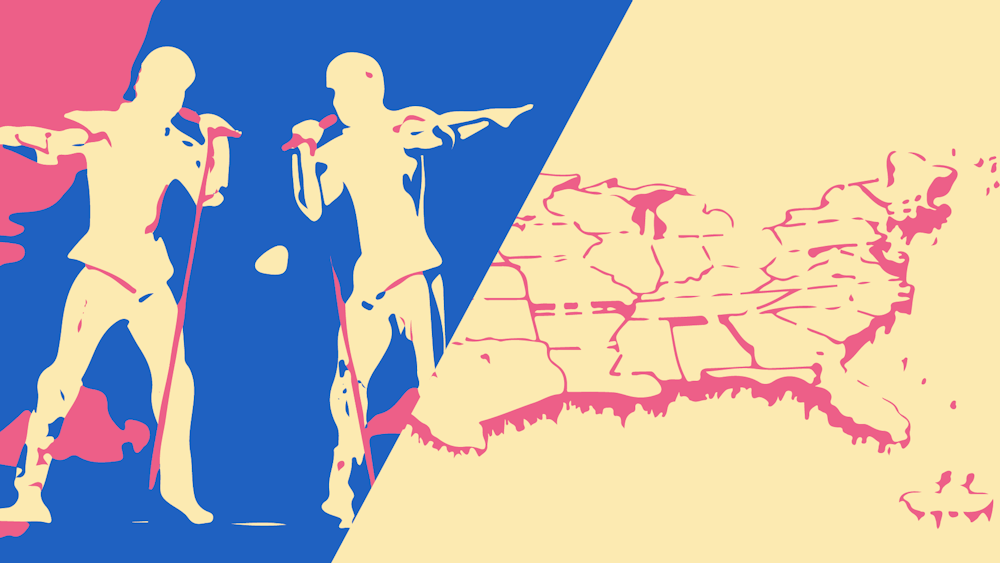Hamster wheels. Yodeling. A gaggle of grandmothers. You never quite know what to expect in the Eurovision Song Contest, Europe’s annual competition in which roughly 40 countries send an artist to represent their nation with an original song. The contest, which started after World War II as an attempt to heal the continent with just seven countries, has grown into an annual celebration of music, fun, kitsch, and glamor. It’s launched the careers of ABBA, Celine Dion, and Måneskin. It’s created viral moments. It’s even been lovingly satirized by Will Ferrell.
And now, it’s America’s turn.
The producers behind The Voice and Eurovision have worked together to create the new NBC music competition show American Song Contest (ASC), modeled after Eurovision, and featuring entries from the 50 states, Washington, D.C., and the five territories. Similarly to Eurovision, both a large national jury and viewer voting system will combine to see who progresses through the competition. There are even built–in algorithms within the scoring process to ensure states with larger populations aren’t overrepresented. Three weeks into the qualifying rounds, there've already been some exciting songs released, and Kelly Clarkson and Snoop Dogg have been praised for their hosting.
Otherwise, however, the critical reception to the show has been consistently negative. Near–constant comparisons to Eurovision don’t help as the new format attempts to stand on its own two feet. The format, which is more often reality show than true “song contest,” fails to capture the spontaneity of Eurovision. The music has been labeled as generic and uninspired in comparison to the wacky and unique performances that define its sister contest. The pacing of the show has been criticized, as well as the strange blend of already–famous competitors with unknowns.
But it really isn’t all bad. When considering together the progress that Eurovision has made over its 66–year history and the ingredients for success that are already present in the ASC, it’s hard not to see the potential that exists for the United States to create an equally iconic tradition.
Exhibit A: The diverse set of songs that've been performed in the first three weeks already offer some unique, amusing, and even weird ways for the artists to stand out. The artistic teams that send entries to Eurovision quickly figured out the benefit of making an act noticeable. While this has led to some of Eurovision’s more gimmicky moments, it's also led to many brilliant, memorable live performances. Much of the ASC’s music is too boring to be distinguishable, but some teams have already stumbled upon this concept; the most played tune on Spotify from the competition is “Wonderland” by AleXa—a K–Pop artist from Oklahoma. And the semi–viral Wyoming entry “New Boot Goofin” by Ryan Charles puts a distinctly American edge on the eccentric, funky fun of unforgettable song contest shenanigans. We may not be quite on the same level of bizarre as Eurovision’s Latvian entry for this year, “Eat Your Salad” (“Instead of meat, I eat veggies and pussy / I like them both fresh, like them both juicy”). But one day, we might get there!
Furthermore, some genuinely great tunes have emerged from the competition thus far. As is the case with my Eurovision viewing, some of my favorites have been tragically eliminated in the preliminary rounds (RIP “Feel Your Love” by Wisconsin’s Jake’O). And as is the case with Eurovision, for which I loosely root for Israel, I’m distracted from my own home state’s entry (my apologies to Ohio and Macy Gray) because I've become such a fan of other songs. North Dakota’s Chloe Fredericks is wildly powerful on “Can’t Make You Love Me” and Broderick Jones’ entry for Kansas, “Tell Me,” offers a vibey feel that definitely explores a new aesthetic from Eurovision’s occasionally over–the–top nature.
Ultimately, however, the thing that has me the most excited about the ASC is the news coverage from local and state media outlets. There's enthusiasm ready to be rallied behind each state’s entry, and if the contest can engage the states more directly, there’s potential for lots of fun and rallying. Clearly, Americans love to root for the home team—when we consider the excitement our nation puts into just football, it’s amazing that we haven’t gotten an interstate music contest before now.
Right now, there’s a lack of connection between each state’s citizens and what's happening on screen. In comparison to Europe, where most countries have a preliminary contest to determine their Eurovision entry, Americans have very little power to influence how they want their state represented. The beauty of something so wacky and artistic as a song competition is in its ability to charge up a cheering section without fostering hatred for the other competitors. A true love of the music that makes up all parts of our country can flourish. But without citizens’ ability to participate in the whole process of the contest, the ASC is less real and more reality TV.
Executive producer Ben Silverman states his hopes for the show: “When America is more fractionalised than ever and we are dealing with so many issues that divide us, the one [thing] that truly unites us is our culture … It can unite it by celebrating its diversity, its distinctions and in pulling everyone around its love of music and its love of song.” If the producers maintain this faith enough to let the American Song Contest evolve, and let the American people truly participate, it will do just that.

